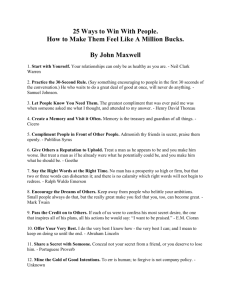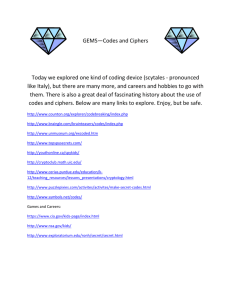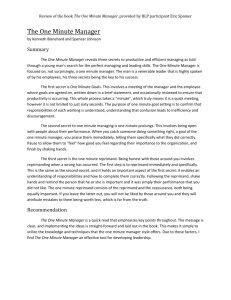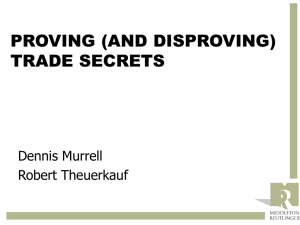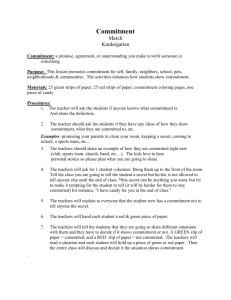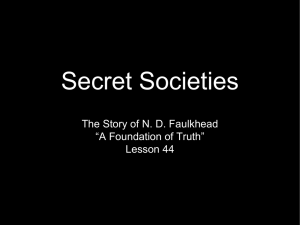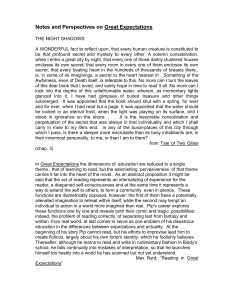Trade secret
advertisement
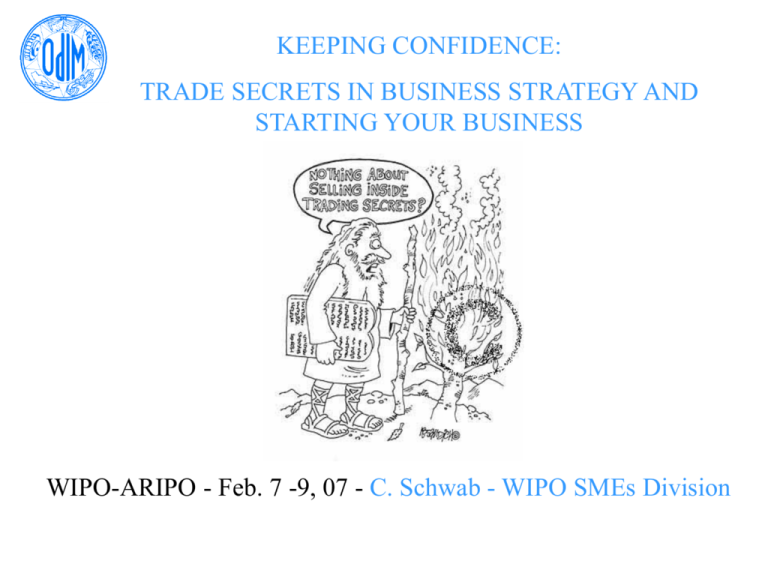
KEEPING CONFIDENCE: TRADE SECRETS IN BUSINESS STRATEGY AND STARTING YOUR BUSINESS WIPO-ARIPO - Feb. 7 -9, 07 - C. Schwab - WIPO SMEs Division WHAT IS A TRADE SECRET? Why Trade Secret Protection Is Important WHAT IS A TRADE SECRET? In its simplest terms, a trade secret is information which a business wants to keep secret, because keeping the information secret helps the business or the release of the information could harm the business and help its competitors. Unfortunately, application of the trade secret law is a good deal more difficult than stating what it does. There is no trade secret law, although some statutes provided similar protection in certain limited circumstances. Why Trade Secret Protection Is Important Why Trade Secret Protection Is Important Patents, trademarks and copyrights are obtained through application to government agencies and defended by lawsuits against infringers. TRADE SECRETS Trade secrets are the neglected sibling, and yet may represent the largest single contribution to intangible assets. WHAT IS A TRADE SECRET? "Trade secret" means information, including a formula, pattern, compilation, program device, method, technique, or process, that: (i) derives independent economic value, actual or potential, from no being generally known to, and not being readily ascertainable by proper means by, other persons who can obtain economic value from its disclosure or use, and (ii) is the subject of efforts that are reasonable under the circumstances to maintain its secrecy. Why Trade Secret Protection Is Important “COCA-COLA” TRADE SECRETS Pemberton, a medicine inventor and morphine addict, created Coca-Cola out of a secret mixture of stimulant coca-leaf and African kola nuts, which contain caffeine. He originally sold it as Pemberton’s French Wine Coca — a knock-off of the popular Mariani wine favoured by Queen Victoria that was produced by a Corsican entrepreneur by adding cocaine to low-grade Bordeaux. When Atlanta declared Prohibition in 1886, however, Pemberton recreated his beverage as a “temperance drink” and gave it the name suggested by his bookkeeper, Coca-Cola. Bradham, a medical school drop-out, entered the market in 1893 with a concoction initially intended to cure stomach pains, or dyspepsia. His recipe contained pepsin, a digestive enzyme extracted from pigs’ stomachs. “Brad’s Drink” became Pepsin Cola in 1896 and then Pepsi-Cola in 1898. THREE CHARGED WITH STEALING COCA-COLA TRADE SECRETS The soft-drinks makers have been battling ever since Caleb Bradham, of North Carolina, came up with Pepsi-Cola, originally called “Brad’s Drink”, to rival Coca-Cola, concocted by John Pemberton, an Atlanta pharmacist, seven years earlier, in 1886. When PepsiCo received a mysterious letter in May offering “very detailed and confidential information” on Coke, the company quickly tipped off its main competitor. The FBI mounted a sting operation and made three arrests — including the secretary of a top Coke executive — on the day a $1.5 million payment was to be made. COCA-COLA TRADE SECRET CASE By Edward Wei - Epoch Times Nashville Staff Jul 08, 2006 SECRET INTACT: Vanilla Coke products are seen in a grocery store in Park Ridge, Illinois. (Tim Boyle/Getty Images) Three people were charged with the illegal theft and sale of trade secrets from The Coca-Cola Company to its main rival, PepsiCo Inc. Ibrahim Dimson of Bronx, New York; Edmund Duhaney of Decatur, Georgia; and Joya Williams of Norcross, Georgia, have been arrested and charged in a criminal complaint for wire fraud and unlawfully stealing and selling trade secrets from Coca-Cola, according to a press release issued from the office of Attorney General David E. Nahmias of the Northern District of Georgia. On May 1, 2006, the Purchase, New York-based PepsiCo received a letter in an official business envelope from Coca-Cola. The letter, postmarked from Bronx, New York, was sent from an individual named "Dirk," who claimed to be a top-level employee from Coca-Cola and offered "very detailed and confidential information." PepsiCo immediately notified Coca-Cola and later contacted the FBI. COCA-COLA TRADE SECRET CASE By Edward Wei - Epoch Times Nashville Staff Jul 08, 2006 SECRET INTACT:) Coke's secret is safe; but what about others? After nearly two months of investigation, the FBI made three arrests on July 5, when an undercover agent offered to buy the remaining trade secrets for $1.5 million from "Dirk." One of the three arrested, Joya Williams, was an administrative assistant employed by Coca-Cola in Atlanta who had access to highly confidential corporate information. Company surveillance videos showed Williams at her desk searching through multiple files, looking for documents and stuffing them into bags. She also was observed holding a liquid container with a white label—a new Coca-Cola product sample—and placing it into her bag. Coca-Cola later verified the sample as genuine and in fact a product under development. When asked for the name of the new product and its possible launch, company spokeswoman Crystal Walker replied, "This is corporation secret. I can't provide any information." COCA-COLA TRADE SECRET CASE By Edward Wei - Epoch Times Nashville Staff Jul 08, 2006 "Sadly, today's arrests include an individual within our company," wrote Neville Isdell, CEO of CocaCola, in a memo to company employees. "While this breach of trust is difficult for all of us to accept, it underscores the responsibility we each have to be vigilant in protecting our trade secrets. Information is the lifeblood of the company." Williams was released on a $25,000 bond late last week after a court hearing. Outside the courthouse, Williams' parents and attorney denied any wrongdoing. They claimed that "she was merely taking some work home," and she put a bottle of the new product sample in her purse because "she thought she might be thirsty." SECRET INTACT: Vanilla Coke products are seen in a grocery store in Park Ridge, Illinois. (Tim Boyle/Getty Images) Walker said the original recipe is still safely locked in an underground safe inside a SunTrust Bank location. She refused to comment on whether the high media exposure will help increase the sale of its soft drinks. On Friday, Coca-Cola's shares fell 15 cents to $43.18 on the New York Stock Exchange. Why Trade Secret Protection Is Important Today, the value of a company's intangible assets exceed those of its tangible assets. This difference in value is the market's assessment of the value of a company's intangible assets: good will, branding, patents, trademarks, copyrights, and trade secrets. Of these, trade secrets are the neglected sibling, and yet may represent the largest single contribution to intangible assets. Why Trade Secret Protection Is Important Good will is established and managed by the company's public relations and customer service organizations. Branding is accomplished and maintained by the company's marketing communications and advertising departments. The intellectual property - patents, trademarks, copyrights and trade secrets - is managed by the company's legal department. Why Trade Secret Protection Is Important Identify the information which is considered to be a TRADE SECRET. Failure to identify trade secrets is a common stumbling block to proving a trade secret in court. There is no way that someone can be expected to maintain information as a trade secret when the fact that it is considered a trade secret has never been expressed. Identifying the trade secrets in a written notice that is signed by those expected to keep the secret, such as a non-disclosure agreement, is best, because it can later be proven in court. Don't try to identify everything as a trade secret. Often non-disclosure and confidentiality agreements try to cover everything with general language (i.e. "All information provided by ABC, Co. is considered proprietary, confidential and a trade secret."). The more general and sweeping the identification of the information considered a trade secret, the more likely a court is to find that the identification of what is really a trade secret is insufficient. Don't try to identify everything as a trade secret. The court could then find there were no trade secrets. Writing a confidentiality agreement, in which the scope of the information to be protected is broad but still enforceable, is a job for an attorney familiar with trade secret law. Not all information will qualify as a trade secret Not all information can be protected as a trade secret. Some information, even if all the proper steps are taken, simply will not qualify to be a trade secret. Most commonly, this involves information which is already in the public domain (available to the public). Not all information will qualify as a trade secret. A client list made up of all the bottling companies in an area will not be a trade secret. Anyone can obtain that information from telephone books or a dozen other sources. However, a client list made up of all the bottling companies, with the names and birthdays of the purchasing agent and the inventory selection most requested by that agent, could be a trade secret. Why Trade Secret Protection Is Important Trade secrets are different from the other forms of intellectual property, in that the protection of trade secrets requires establishment and maintenance. In this way, trade secrets are more like good will and branding. Trade secrets require continuous effort in order to allow defense by lawsuits against infringers at a later time, rather than a single application and grant by a federal agency. It is no wonder, then, that the management of trade secrets is often poorly understood and poorly performed even in the best of companies. Why Trade Secret Protection Is Important . Yet trade secret protection offers much broader scope than patents, trademarks, or copyright. Patents require that the invention be novel, useful, and non-obvious, be publicly disclosed, and conform to a definition of patentable subject matter. In addition, exclusive rights expire no more than 20 years after application. Why Trade Secret Protection Is Important . Trademarks protect only the printed word or image referencing a product or service in commerce. Copyrights protect only the manner of expression, but not the content - the idea, information, or concept - being communicated. Why Trade Secret Protection Is Important Trade secrets are eternal. They need not conform to any definition of patentable subject matter. They need not be novel or non-obvious, only useful. They protect the content as well as the expression. The only requirement is that trade secrets be kept secret and that the people who are informed be brought to sign NDAs and other legal documents, engaging them to observe total confidentiality. Actually protect the information identified as TRADE SECRETS It is not uncommon for companies to require confidentiality or non-disclosure agreements be signed at the outset of employment or at the beginning of a project and then do nothing further to protect the information. It is not enough to have a non-disclosure agreement! The information must then be treated as SECRET! Actually protect the information identified as TRADE SECRETS It is not uncommon for companies to require confidentiality or non-disclosure agreements be signed at the outset of employment or at the beginning of a project and then do nothing further to protect the information. It is not enough to have a non-disclosure agreement! The information must then be treated as if it were a secret. It can not be made available to anyone, taken home at will, shared with customers or clients, or left out on desks overnight. The law requires reasonable efforts to protect the secrecy of the information. Absent those efforts, courts will not find that there is a trade secret. Why Trade Secret Protection Is Important The typical response to keeping trade secrets secure is to use better and more sophisticated ways to lock them up. Passwords and dongles, secure facilities, security guards and name badges, and internet firewalls all serve to lock trade secrets up more securely. Companies spend billions of dollars per year on such methods.

